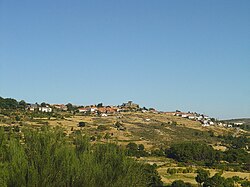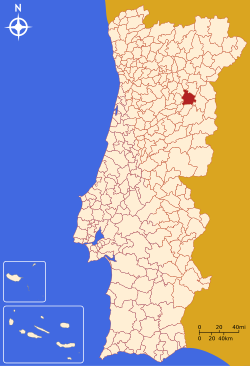Trancoso, Portugal
| Trancoso | |||
|---|---|---|---|
| Municipality | |||

A panorama of Trancoso, Portugal
|
|||
|
|||
 |
|||
| Coordinates: 40°47′N 7°21′W / 40.783°N 7.350°WCoordinates: 40°47′N 7°21′W / 40.783°N 7.350°W | |||
| Country |
|
||
| Region | Centro | ||
| Subregion | Beira Interior Norte | ||
| Intermunic. comm. | Beiras e Serra da Estrela | ||
| District | Guarda | ||
| Parishes | 21 | ||
| Government | |||
| • President | Júlio Sarmento (PSD) | ||
| Area | |||
| • Total | 361.52 km2 (139.58 sq mi) | ||
| Population (2011) | |||
| • Total | 9,878 | ||
| • Density | 27/km2 (71/sq mi) | ||
| Time zone | WET/WEST (UTC+0/+1) | ||
| Website | http://www.cm-trancoso.pt | ||
Trancoso (Portuguese pronunciation: [tɾɐ̃ˈkozu]) is a city and a municipality in Portugal. The municipality population in 2011 was 9,878, in an area of 361.52 km². The city (cidade) population is about 3.000.
The municipality is located in the District of Guarda, Region Centro, sub region Beira Interior Norte.
The present Mayor is Amilcar Salvador. The municipal holiday is May 29. Principal monument: Castle of Trancoso. The municipality is served by the Vila Franca das Naves train station on the Beira Alta line from Pampilhosa to the Spanish border.
Trancoso is well known as the place where the 16th century poet and shoemaker António Gonçalves de Bandarra lived and made his prophetic texts. A statue of him was erected in front of the city hall.
Administratively, the municipality is divided into 21 civil parishes (freguesias):
...
Wikipedia


